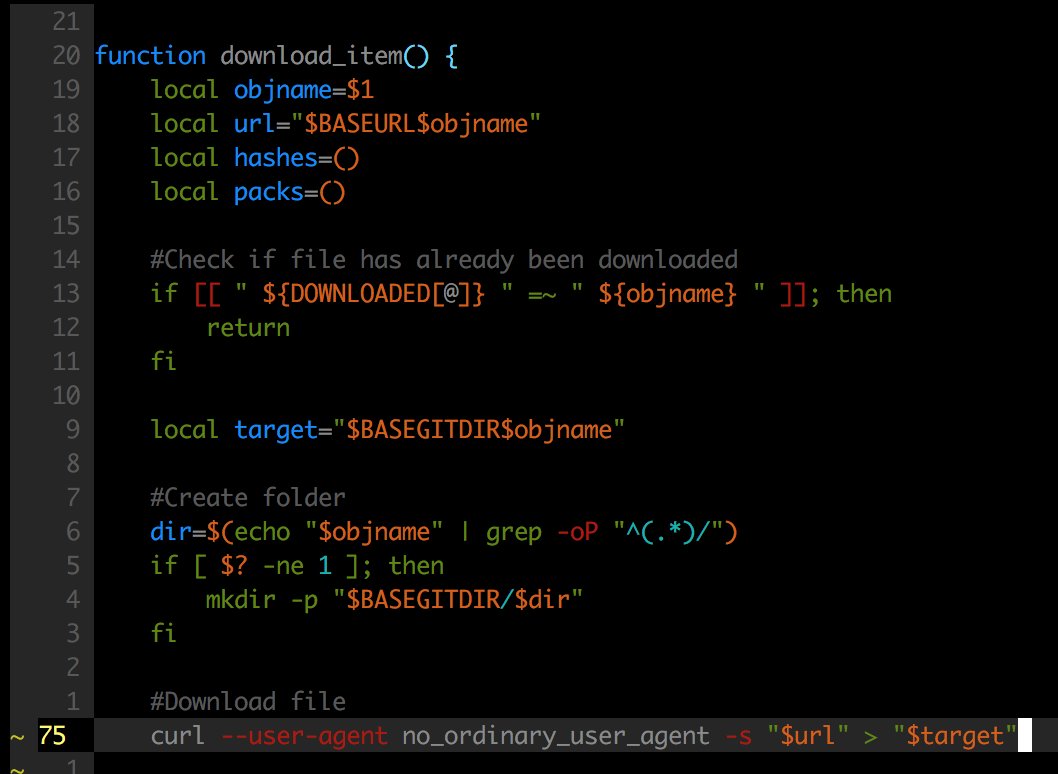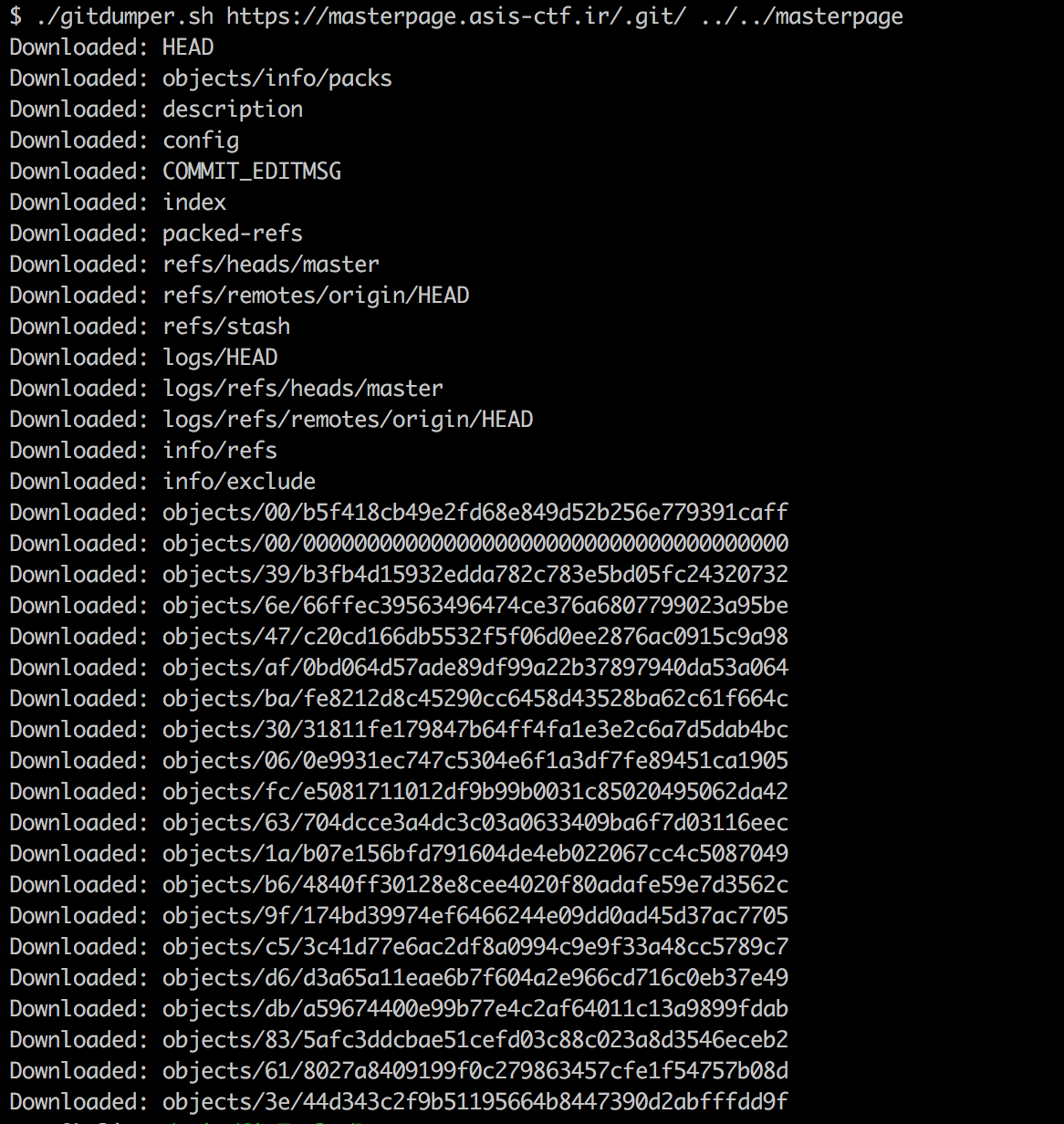ASIS Finals 2016 / Masterpage
September 12, 2016
Description
We pwned ciphers and web services… Yet we found another administration page which is now locked.. can you access this page?
The Challenge
In this challenge, we were giving an ordinary login form.

Upon submission of the form, we get two different behaviors.
The resulting webpage would contain either Blocked! or Too long! depending on the size of the username and password.
Obtaining the source code
Through a bit of recon, we discovered a .git folder at the root of the website :

At this point, we can use GitTools to extract the source code of the website.
As this website is behind cloudflare, we have to update the source code of the tool a bit since
CloudFlare will block curl requests based on the user-agent.
In the gitdumper.sh script, we update the curl request with an updated user-agent :

We then run the script :

SQL injection
With the git repository at hand, we can understand how the login form works :
Run git checkout . to retrieve the index.php page.
<?php
...
$id = $mysql->filter($_POST['user'], "auth");
$pw = $mysql->filter($_POST['pass'], "pass");
$ip = $mysql->filter($_SERVER['REMOTE_ADDR'], "hash");
/* resolve ip addr. */
$dns = dns_get_record(gethostbyaddr($ip));
$ip = ($dns) ? print_r($dns, true) : ($ip);
/* mysql filtration */
$filter = "_|information|schema|con|\_|ha|b|x|f|@|\"|`|admin|cas|txt|sleep|benchmark|procedure|\^";
foreach($_POST as $_VAR){
if(preg_match("/{$filter}/i", $_VAR) || preg_match("/{$filter}/i", $ip))
{
exit("Blocked!");
}
}
if(strlen($id.$pw.$ip) >= 1024 || substr_count("(", $id.$pw.$ip) > 2)
{
exit("Too Long!");
}
/* admin auth */
$query = "SELECT id, pw FROM admin WHERE id='{$id}' AND pw='{$pw}' AND ip='{$ip}';";
$result = $mysql->query($query, 1);
if($result['id'] === "admin" && $result['pw'] === $_POST['pw'])
{
echo $flag."<HR>";
}
...
?>
Basically, this application takes the supplied user and pass parameter as well as the hostname of your current IP address,
filters it through $mysql->filter() and uses it in an SQL query.
The server will spit out the flag only if the result of the query
returns an id of admin and a pw supplied through the $_POST['pw'] parameter. Keep in mind that the $_POST['pw'] is not
the $_POST['pass'] parameter that we supplied initially.
Here is the source code for $mysql->filter() :
<?php
...
function filter($str, $type='sql'){
switch($type){
case "url":
return preg_replace("/[^a-zA-Z0-9-_&\/]/", "", $str);
case "sql":
if($this->conn){
$_filter = preg_replace("/[^a-zA-Z0-9-_!@#$.%^+&*(){}]/", "", $str);
if($this->mysqli){
return mysqli_real_escape_string($this->conn, $_filter);
}else{
return mysql_real_escape_string($_filter, $this->conn);
}
}
case "memo":
if($this->conn){
$_filter = htmlspecialchars(preg_replace("/[^a-zA-Z0-9-_:+!@#$.%^&*(){}:\/.\ <>]/", "", $str));
if($this->mysqli){
return mysqli_real_escape_string($this->conn, $_filter);
}else{
return mysql_real_escape_string($_filter, $this->conn);
}
}
case "auth":
return preg_replace("/[^a-zA-Z0-9-_!@#$.%^&*()\\]/", "", $str);
}
return $str;
?>
}
...
As we can see, the pass and ip fields aren’t filtered as there are no pass and hash cases in the filter() function.
$id = $mysql->filter($_POST['user'], "auth");
$pw = $mysql->filter($_POST['pass'], "pass");
$ip = $mysql->filter($_SERVER['REMOTE_ADDR'], "hash");
There is also a second set of lines that filter are input :
$filter = "_|information|schema|con|\_|ha|b|x|f|@|\"|`|admin|cas|txt|sleep|benchmark|procedure|\^";
foreach($_POST as $_VAR){
if(preg_match("/{$filter}/i", $_VAR) || preg_match("/{$filter}/i", $ip))
{
exit("Blocked!");
}
}
This filter checks all parameters passed through the POST request and blocks the request based on the $filter regex.
Nevertheless, we can still bypass this by using SQL string manipulation functions and obtain the flag. Here is the final payload :

With this payload, we inject a UNION query that will return a row containing an
id of admin and a pw of 0, resulting in the flag being printed on the page :
